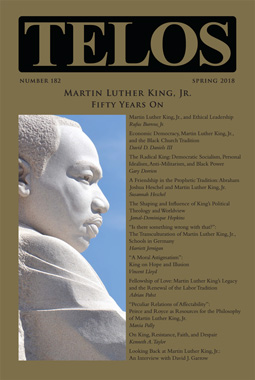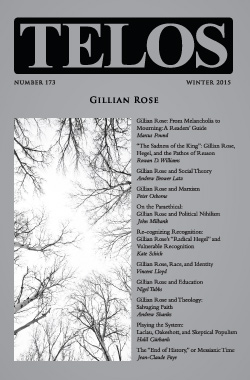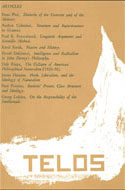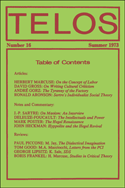By Harriett Jernigan · Wednesday, April 4, 2018 Harriett Jernigan’s “‘Is there something wrong with that?’: The Transculturation of Martin Luther King, Jr., Schools in Germany” appears in Telos 182 (Spring 2018), a special issue commemorating the life and thought of Martin Luther King, Jr. Read the full article at the Telos Online website, or purchase a print copy of the issue in our online store. Individual subscriptions to Telos are now available in both print and online formats.
 While it is common knowledge that a number of elementary, middle, and high schools in the United States are named after Martin Luther King, Jr., few people know that the Federal Republic of Germany is also home to a significant number of schools named in honor of him as well. The differences between American and German school systems, in particular the manner in which children are placed in special-needs schools in Germany, prompt a transculturation of the symbolic value of Martin Luther King, Jr., as the schools’ mission statements reflect. Although both American and German MLK schools are generally conspicuously diverse and underscore the importance of equality and diversity, their priorities diverge thereafter, with American MLK schools emphasizing academic preparation for upward mobility and global citizenship, and German MLK schools nonviolence and local integration, a divergence that arises partially from the priority German Leitkultur places on German-language proficiency. While it is common knowledge that a number of elementary, middle, and high schools in the United States are named after Martin Luther King, Jr., few people know that the Federal Republic of Germany is also home to a significant number of schools named in honor of him as well. The differences between American and German school systems, in particular the manner in which children are placed in special-needs schools in Germany, prompt a transculturation of the symbolic value of Martin Luther King, Jr., as the schools’ mission statements reflect. Although both American and German MLK schools are generally conspicuously diverse and underscore the importance of equality and diversity, their priorities diverge thereafter, with American MLK schools emphasizing academic preparation for upward mobility and global citizenship, and German MLK schools nonviolence and local integration, a divergence that arises partially from the priority German Leitkultur places on German-language proficiency.
Continue reading →
By Brent Ranalli · Thursday, May 12, 2016 Adam Smith is usually remembered as a champion of commerce. But as a moral philosopher he understood that even as commerce inculcates the virtues of industry, frugality, and temperance, it also inculcates vices such as avarice, envy, and short-sighted self-centeredness. Smith recognized that good government requires virtues such as honor, moral rectitude, patriotism, magnanimity, and a far-sighted perspective, to which the commercial vices are fairly opposed. Smith considered this a problem in his own day, as Great Britain was threatening to become a nation of shopkeepers, ruled by classes trained not in statesmanship but in commerce, governed not by codes of honor but by self-interest. The problem has resonance today as well.
Continue reading →
By Nigel Tubbs · Thursday, February 4, 2016  In her preface to the 1995 edition of Hegel Contra Sociology, Gillian Rose says that her project is “to demonstrate a nonfoundational and radical Hegel, which overcomes the opposit[ion] between nihilism and rationalism” and can renew critical thought “in the intellectual difficulty of our time.” However, I think this is not quite the case, for two reasons. First, Rose’s Hegel is not nonfoundational. Instead, as the book makes very clear, Rose’s Hegel does think the absolute, or the true. Yet her Hegel is also radical because she does not eschew the “ineluctable difficulty” of the authority of saying that truth either can or cannot be thought. Second, and in the teeth of this apparent inconsistency, thinking the absolute does not “overcome” such oppositions. Instead, it learns of their truth, their self-determination, by rethinking the religious and political presuppositions upon which these oppositions depend. Against the logic of mastery and ownership, or the propertied logic, that continues to dominate Western thinking, in Rose’s Hegel the learning and education which is endemic to the Aufhebung is not prejudged as “overcoming” (i.e., as abstract truth) or “failing to overcome” (yielding chaos and infinite regression). Instead, what it commends, and what I explore in this article, is a different logic of freedom, an educational logic, which can find its truth in preserving and reforming the opposition between nihilism and rationalism. This self-determining educational logic is the work in which thinking can renew itself in the intellectual difficulty of our time. In her preface to the 1995 edition of Hegel Contra Sociology, Gillian Rose says that her project is “to demonstrate a nonfoundational and radical Hegel, which overcomes the opposit[ion] between nihilism and rationalism” and can renew critical thought “in the intellectual difficulty of our time.” However, I think this is not quite the case, for two reasons. First, Rose’s Hegel is not nonfoundational. Instead, as the book makes very clear, Rose’s Hegel does think the absolute, or the true. Yet her Hegel is also radical because she does not eschew the “ineluctable difficulty” of the authority of saying that truth either can or cannot be thought. Second, and in the teeth of this apparent inconsistency, thinking the absolute does not “overcome” such oppositions. Instead, it learns of their truth, their self-determination, by rethinking the religious and political presuppositions upon which these oppositions depend. Against the logic of mastery and ownership, or the propertied logic, that continues to dominate Western thinking, in Rose’s Hegel the learning and education which is endemic to the Aufhebung is not prejudged as “overcoming” (i.e., as abstract truth) or “failing to overcome” (yielding chaos and infinite regression). Instead, what it commends, and what I explore in this article, is a different logic of freedom, an educational logic, which can find its truth in preserving and reforming the opposition between nihilism and rationalism. This self-determining educational logic is the work in which thinking can renew itself in the intellectual difficulty of our time.
Continue reading →
Telos 173 (Winter 2015) is now available for purchase in our store.
 Gillian Rose (1947–1995) had an influence in excess of her literary output and treatment in secondary literature. Author of eight books, two articles, and four book reviews, she also had important, though perhaps hidden, effects on the UK academic scene through academic friendship, doctoral supervision, and interdisciplinary work. She inspired many students and colleagues, even where she does not appear in bibliographies or citations. She made major contributions to introducing the Frankfurt School to the UK; aided the Hegel renaissance in English-language scholarship; and was an early critic of post-structuralism and political theology. Several of the papers gathered here were first given at a conference at Durham University on January 9, 2015, to mark the twentieth year since Rose’s death. That conference and this special issue of Telos are premised on the view that Rose’s work still has much philosophical insight and inspiration to offer. The authors of these papers were students, colleagues, and/or friends of Rose, or studied her work as part of their doctoral research. The diversity of their fields reflects some of the range and interdisciplinarity of Rose’s own work: Hegel, social theory, Marxism, politics, race, recognition theory, education, and theology. We hope that this issue provokes a renewed interest in what Rose can still offer us today. Gillian Rose (1947–1995) had an influence in excess of her literary output and treatment in secondary literature. Author of eight books, two articles, and four book reviews, she also had important, though perhaps hidden, effects on the UK academic scene through academic friendship, doctoral supervision, and interdisciplinary work. She inspired many students and colleagues, even where she does not appear in bibliographies or citations. She made major contributions to introducing the Frankfurt School to the UK; aided the Hegel renaissance in English-language scholarship; and was an early critic of post-structuralism and political theology. Several of the papers gathered here were first given at a conference at Durham University on January 9, 2015, to mark the twentieth year since Rose’s death. That conference and this special issue of Telos are premised on the view that Rose’s work still has much philosophical insight and inspiration to offer. The authors of these papers were students, colleagues, and/or friends of Rose, or studied her work as part of their doctoral research. The diversity of their fields reflects some of the range and interdisciplinarity of Rose’s own work: Hegel, social theory, Marxism, politics, race, recognition theory, education, and theology. We hope that this issue provokes a renewed interest in what Rose can still offer us today.
Continue reading →
By Matt Applegate · Thursday, March 13, 2014 As an occasional feature on TELOSscope, we highlight a past Telos article whose critical insights continue to illuminate our thinking and challenge our assumptions. Today, Matt Applegate looks at Paul Piccone’s “Students’ Protest, Class-Structure, and Ideology” from Telos 3 (Spring 1969).
 Paul Piccone’s 1969 essay “Students’ Protest, Class-Structure, and Ideology” captures the revolutionary ethos of that time in the United States. Hippies, student politics, Black Power, as well as the work of such figures as Régis Debray and Herbert Marcuse all come under Piccone’s earnest critical consideration. His primary concern, however, is the link between these student revolts and the state of education in the United States. On the one hand, Piccone is intent on charting the means by which hyper-industrialization and the technologization of work lead to open student rebellion. On the other, he is interested in understanding why student rebellion is effective in relation to other forms of revolutionary organization that appear alongside it. Paul Piccone’s 1969 essay “Students’ Protest, Class-Structure, and Ideology” captures the revolutionary ethos of that time in the United States. Hippies, student politics, Black Power, as well as the work of such figures as Régis Debray and Herbert Marcuse all come under Piccone’s earnest critical consideration. His primary concern, however, is the link between these student revolts and the state of education in the United States. On the one hand, Piccone is intent on charting the means by which hyper-industrialization and the technologization of work lead to open student rebellion. On the other, he is interested in understanding why student rebellion is effective in relation to other forms of revolutionary organization that appear alongside it.
Continue reading →
By Matt Applegate · Tuesday, February 11, 2014 As an occasional feature on TELOSscope, we highlight a past Telos article whose critical insights continue to illuminate our thinking and challenge our assumptions. Today, Matt Applegate looks at André Gorz’s “The Tyranny of the Factory: Today and Tomorrow” from Telos 16 (Summer 1973).
 “There is a link between the crisis of School (school instruction) and the crisis of tyranny in the factory,” André Gorz proclaims in his 1973 article “The Tyranny of the Factory: Today and Tomorrow” (64). An Austrian-born social theorist, Gorz is known primarily for his interventions in political ecology and social analysis of capitalism. His focus on capital and education is not unrelated here, however. Substantively more than an abstract analysis of working conditions in the contemporary factory or a sweeping statement concerning the state of education in France, Gorz links the culture of factory labor to the imperatives of discipline and command in educational settings. The underlying claim here is that the logic of capitalism and the raison d’être of state-run education have become synonymous, resulting in both an auto-social response to capital’s hegemony in all forms of life and the elimination of pedagogical forms that inspire critical thought and practice. With this claim, at least three points of focus must be highlighted. “There is a link between the crisis of School (school instruction) and the crisis of tyranny in the factory,” André Gorz proclaims in his 1973 article “The Tyranny of the Factory: Today and Tomorrow” (64). An Austrian-born social theorist, Gorz is known primarily for his interventions in political ecology and social analysis of capitalism. His focus on capital and education is not unrelated here, however. Substantively more than an abstract analysis of working conditions in the contemporary factory or a sweeping statement concerning the state of education in France, Gorz links the culture of factory labor to the imperatives of discipline and command in educational settings. The underlying claim here is that the logic of capitalism and the raison d’être of state-run education have become synonymous, resulting in both an auto-social response to capital’s hegemony in all forms of life and the elimination of pedagogical forms that inspire critical thought and practice. With this claim, at least three points of focus must be highlighted.
Continue reading →
|
|
 While it is common knowledge that a number of elementary, middle, and high schools in the United States are named after Martin Luther King, Jr., few people know that the Federal Republic of Germany is also home to a significant number of schools named in honor of him as well. The differences between American and German school systems, in particular the manner in which children are placed in special-needs schools in Germany, prompt a transculturation of the symbolic value of Martin Luther King, Jr., as the schools’ mission statements reflect. Although both American and German MLK schools are generally conspicuously diverse and underscore the importance of equality and diversity, their priorities diverge thereafter, with American MLK schools emphasizing academic preparation for upward mobility and global citizenship, and German MLK schools nonviolence and local integration, a divergence that arises partially from the priority German Leitkultur places on German-language proficiency.
While it is common knowledge that a number of elementary, middle, and high schools in the United States are named after Martin Luther King, Jr., few people know that the Federal Republic of Germany is also home to a significant number of schools named in honor of him as well. The differences between American and German school systems, in particular the manner in which children are placed in special-needs schools in Germany, prompt a transculturation of the symbolic value of Martin Luther King, Jr., as the schools’ mission statements reflect. Although both American and German MLK schools are generally conspicuously diverse and underscore the importance of equality and diversity, their priorities diverge thereafter, with American MLK schools emphasizing academic preparation for upward mobility and global citizenship, and German MLK schools nonviolence and local integration, a divergence that arises partially from the priority German Leitkultur places on German-language proficiency. 
 Paul Piccone’s 1969 essay
Paul Piccone’s 1969 essay  “There is a link between the crisis of School (school instruction) and the crisis of tyranny in the factory,” André Gorz proclaims in his 1973 article “The Tyranny of the Factory: Today and Tomorrow” (64). An Austrian-born social theorist, Gorz is known primarily for his interventions in political ecology and social analysis of capitalism. His focus on capital and education is not unrelated here, however. Substantively more than an abstract analysis of working conditions in the contemporary factory or a sweeping statement concerning the state of education in France, Gorz links the culture of factory labor to the imperatives of discipline and command in educational settings. The underlying claim here is that the logic of capitalism and the raison d’être of state-run education have become synonymous, resulting in both an auto-social response to capital’s hegemony in all forms of life and the elimination of pedagogical forms that inspire critical thought and practice. With this claim, at least three points of focus must be highlighted.
“There is a link between the crisis of School (school instruction) and the crisis of tyranny in the factory,” André Gorz proclaims in his 1973 article “The Tyranny of the Factory: Today and Tomorrow” (64). An Austrian-born social theorist, Gorz is known primarily for his interventions in political ecology and social analysis of capitalism. His focus on capital and education is not unrelated here, however. Substantively more than an abstract analysis of working conditions in the contemporary factory or a sweeping statement concerning the state of education in France, Gorz links the culture of factory labor to the imperatives of discipline and command in educational settings. The underlying claim here is that the logic of capitalism and the raison d’être of state-run education have become synonymous, resulting in both an auto-social response to capital’s hegemony in all forms of life and the elimination of pedagogical forms that inspire critical thought and practice. With this claim, at least three points of focus must be highlighted. 

